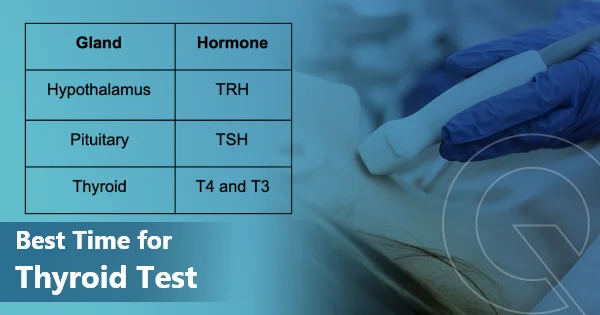Thyroid function plays a crucial role in maintaining overall health and well-being. Whether you suspect a thyroid issue or you’re undergoing routine check-ups, the timing of your thyroid test can impact the accuracy of the results. In this blog, we’ll explore the best time for thyroid tests to ensure you receive the most reliable and informative results.
Contents
Understanding the Thyroid Gland
Before diving into the timing of thyroid tests, it’s essential to understand the thyroid gland’s function. This small, butterfly-shaped gland, located in the neck, produces hormones that regulate various bodily functions, including metabolism, energy levels, and body temperature. When the thyroid gland is overactive (hyperthyroidism) or underactive (hypothyroidism), it can lead to a range of health issues.
Thyroid Hormones
Thyroid tests primarily measure two key hormones: Thyroid Stimulating Hormone (TSH) and thyroxine (T4) hormones. TSH is produced by the pituitary gland and acts as a messenger to stimulate the thyroid gland to produce T4. T4, in turn, can be converted into the more active form, triiodothyronine (T3), which affects the body’s metabolism and energy levels.
Best time to test thyroid
The levels of TSH in your bloodstream can fluctuate throughout the day and night. To obtain the most accurate and consistent thyroid test results, it’s important to consider the timing of your test. Here are some key factors to keep in mind:
1. Morning Testing:Best time for tsh test is morning. In general, thyroid tests are often recommended to be performed in the morning, typically between 8:00 AM and 10:00 AM. During this time, TSH levels tend to be at their highest, which provides a more reliable indication of thyroid function.
2. Fasting: It’s a good practice to fast before the test, as eating can temporarily influence TSH levels. Fasting overnight and scheduling your test in the morning can help minimize this interference.
3. Consistency: If you have a regular routine, try to stick to it for each test. TSH levels can also vary based on your sleep-wake cycle and daily activities. Consistency in timing and conditions can make it easier to track changes in your thyroid function over time.
4. Medication: If you’re taking thyroid medication, it’s typically advised to take your medication after the test. However, always follow your doctor’s specific instructions regarding medication and testing.
5. Consult Your Healthcare Provider: Ultimately, the best time for your thyroid test may vary based on your individual circumstances and your healthcare provider’s recommendations. If you have concerns about your thyroid health, consult with your doctor to determine the most appropriate testing schedule.
Conclusion
Thyroid testing is a critical tool in diagnosing and managing thyroid disorders. By understanding the importance of timing and following best practices for thyroid tests, you can ensure that your results are as accurate as possible. If you suspect a thyroid issue or need routine monitoring, don’t hesitate to reach out to your healthcare provider for guidance on the optimal timing for your thyroid tests. Accurate results can lead to better-informed decisions about your health and well-being.
Frequently asked Questions
Q1:What is the best time of day to have a thyroid test?
A1:It’s crucial to select the optimal time for thyroid testing, with morning tests typically yielding the most precise results.
Q2:Is fasting required for thyroid test?
A2:A TSH blood test typically doesn’t require any special preparations. However, if your healthcare provider has requested additional blood tests, you might need to fast for several hours before the test. Your provider will inform you of any specific instructions to follow.
Q3:Can I take a thyroid test anytime?
A3:Usually,no special precautions including fasting need to be followed before taking a thyroid test. However, your pathologist can guide you better. For example, if you have to undergo some other health tests along with thyroid hormone levels, you may be asked to fast for 8-10 hours.





![Blood Test for Hair Loss [Male/Female] Blood Test for Hair Loss](https://oncquest-blog.s3.ap-south-1.amazonaws.com/blog/wp-content/uploads/2023/12/12044200/Blood-Test-for-Hair-Loss.webp)